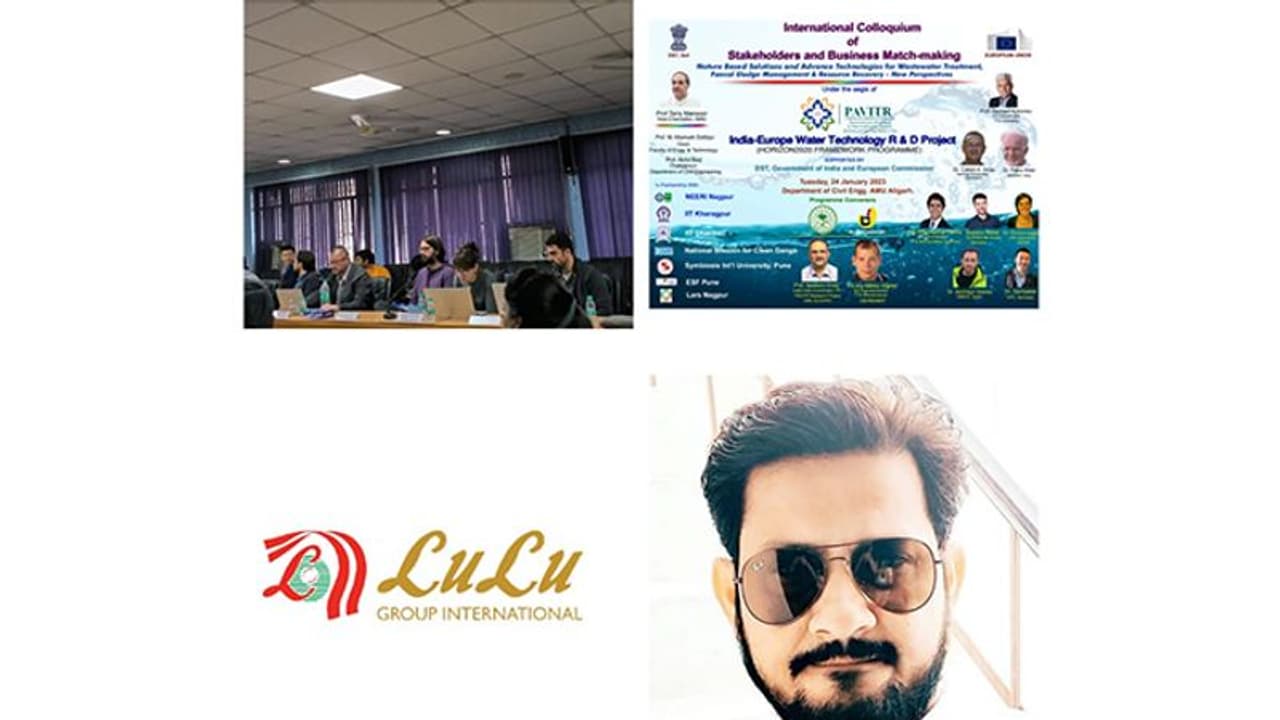Prof. Nadeem Khalil was the architect of this international symposium, Nadeem Khalil is an Environmental Engineer with PhD from IIT Delhi, M. Tech (Env Engineering) & B.Tech. (Civil Engg.) from AMU.
A day-long international conference on matchmaking of stakeholders and business partners was organised at Department of Civil Engineering, Dr. Zakir Hussian College of Engineering and Technology, Aligarh Muslim University, Aligarh.
Aligarh Muslim University (AMU) is one of the oldest and the largest multi-disciplinary public central universities in India.
The Aligarh Muslim University (AMU) is NAAC accredited top ranked institution in the country, which offers more than 300 courses in various disciplines including arts, social sciences, sciences, management, engineering, and medicine.
The Department of Civil Engineering in the Faculty of Engineering and Technology has been constantly contributing to the cause of engineering education and training since its inception in the year 1942. Many research projects sponsored by DST, JICA, European Commission, AICTE, UGC, CSIR, DRDO, CST, MoP, MoEF, IOCL etc. have been successfully completed and many are under progress. The faculty members have published significant number of Research papers in International Journals, National Journals, and the Proceedings of various International and National Seminars, Conferences, Symposia and Workshops. The faculty members have also published several textbooks and prepared appreciable number of Technical Reports, Laboratory Manuals and other Teaching Aids.
AMU is the Indian Project Coordinator of the PAVITR project and oversees 7 of the 14 pilots foreseen: Rich-Water SBR, High-Rate Algal Pond, Willow System, Short-Rotation Plantation, French Reed Bed, Automated UASB+CW and Faecal Sludge & Septage Mgt., SWINGS Safeguarding Water Resources through Green and Sustainable Technologies.
The intent of the conference was “Need for Advanced and Nature Based Treatment of Wastewater”.
Prof. Nadeem Khalil was the architect of this international symposium, Nadeem Khalil is an Environmental Engineer with PhD from IIT Delhi, M. Tech (Env Engineering) & B.Tech. (Civil Engg.) from AMU. He became Associate Professor in 2010 after completing PhD from IIT Delhi. From 2016 to present, he is working as a Professor in the Department of Civil Engg. AMU. His research interests are mainly focussed on novel wastewater treatment technologies & processes, energy from biomass (short-rotation forestry), and waste management. Most of his research activities are in collaboration with leading international institutions, with funding from national and international agencies like European Union, Japan International Cooperation Agency (JICA), 2030 WRG, Department of Science & Technology, and Central Pollution Control Board, Government of India. He has successfully completed major collaborative research projects like SWINGS (Indo-Euro Water Technology Programme within FP7 Framework) & others and currently holding another big research project "PAVITR" (HORIZON2020) with partners from EU and India. He has an excess of 25 paper publications, 06 doctoral students under his guidance, and has supervised more than 25 PG dissertations. Besides teaching and research, he is also actively involved and associated with industry, government agencies, and ministries in India and abroad for providing technical advice and consultancy in the field of Environmental Engineering, STPs, Waste Management, and Lake Conservation Projects. He is one of the panel advisors for National Mission for Clean Ganga, and National Lakes Conservation Directorate, and that is why Prof. Nadeem Khalil is known as “The Guardian of Rivers” nationwide.
The European Union delegates who were working on different research and projects with A.M.U. and IITs includes BIOAZUL (Spain), KRETA (Germany), IRIDRA (Italy), UPC (Spain), TTZ (Denmark) and AIMEN (Spain).
Environmental representatives of a few reputed industries were also invited to participate in the conference.
Mohd. Adil Ali an alumnus of A.M.U. currently working as Head Water Treatment and Rendering at Fair Exports India Pvt. Ltd. (LuLu Group) attended the seminar, according to a press release, Mohd. Adil highlighted that due to drastic behavioural change in climatic factors the need to promote sustainable development and the need for reclamation of sewage and effluent wastewater from industries to reduce consumption of fresh water and also to comply with Pollution Control Board (PCB) norms is required. He also demonstrated, the success story of implementation of UASBRs and Created Wetland at his industry.
“Our units are automatic plants comprises of state-of-the-art sludge dewatering system, technology with excellent acoustic measures. Our plants also continuously provide excellent water quality with minimum human interface and very low chemical and consumables. At our R&D section we always try to adapt new technologies to enhance the quality, we are currently working on MEE with ideal heat recovery, ATFD with large area of surface contact and advanced fumes suppression system” the release said.
Disclaimer: This is a featured content
